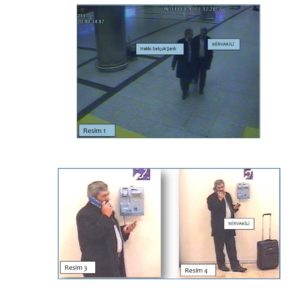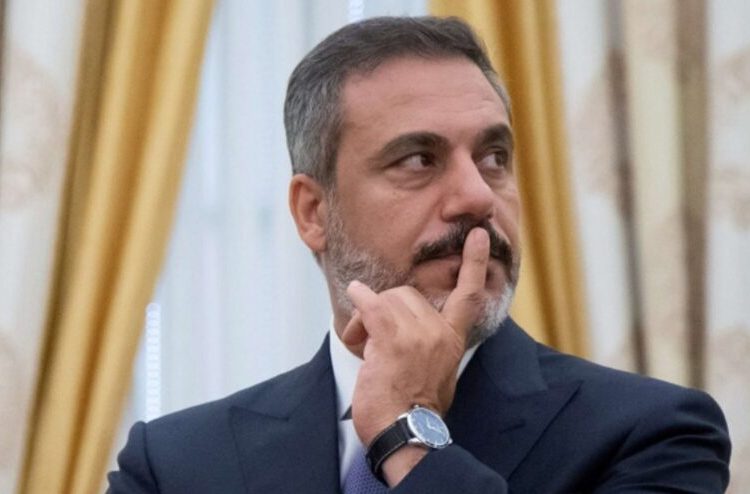Abdullah Bozkurt/Stockholm
The US designation of a Turkish-based money laundering network run by the Islamic Revolutionary Guard Corps (IRGC) Quds Force hit the close associates of Turkish intelligence chief Hakan Fidan, a pro-Iranian Islamist figure.
The designation, announced by the US Treasury in May, sanctioned key operatives of the Quds Force that have secretly been working with Fidan for years. The information provided by US officials corroborated the findings of Turkish police, who had already identified the designated individuals as part of the Quds Force network during a criminal probe run by public prosecutors between 2011 and 2014.
According to the US Department of the Treasury’s Office of Foreign Assets Control (OFAC), Turkish nationals Hakkı Selçuk Şanlı, Abdulhamit Çelik and Seyyid Cemal Gündüz worked with IRGC official Behnam Shahriyari in an international oil smuggling and money laundering network that generated hundreds of millions of dollars on behalf of Iran and its proxy Hezbollah in Lebanon.
The US move rings alarm bells for Turkish spy master Fidan, a confidant of Turkish President Recep Tayyip Erdoğan who was groomed in Shiite study circles during his youth and described as a high value asset by the IRGC.
Summary of wiretaps from confidential Quds Force probe reveals how Hakkı Selçuk Şanlı said Turkish intelligence stopped monitoring him after Hakan Fidan, code-named Emin (trusted man) by Quds Force operatives, became the head of Turkish intelligence agency MIT:
The confidential Turkish probe into the Quds Force had already revealed Fidan’s secret contacts with Quds Force operatives including Şanlı and Shahriyari, the latter operating under the cover name of Sayed Ali Akber Mir Vakili. Shahriyari was part of an illegal cell based in Ankara working closely with Şanlı as well as with Faruk Koca, a former lawmaker, in communicating with Fidan.
In various intercepted communications, the cell members described Fidan as “Emin,” which means “trusted man” in Turkish. They used burner phones and changed the numbers used for communications every two or three months.
Şanlı was arrested on May 13, 2000 and was sentenced to 12 years, six months in prison for involvement in terrorist plots targeting Turkish and US interests. The trial revealed how he and his associates helped set up the Quds Force network in the 1990s on the order of then-IRGC general Nasir Takipur. The group was designated as a terrorist group under the Turkish name of Tevhid Selam.
But he was freed in 2004 when the government of then-prime minister and now president Erdoğan pushed an amnesty bill through parliament, reducing sentences for some convicts. He was put to use again by his handlers after keeping a low profile for years and started running several operations including moving funds on behalf of the Quds Force, providing financial support for jailed Quds Force convicts and managing a recruitment and asset development program for Iranian intelligence in Ankara.

The launch of new operations and reactivating old assets by the Quds Force in Turkey came after a meeting of Iranian President Mahmoud Ahmadinejad and Erdoğan in 2008. The Quds Force shifted into high gear after Erdoğan appointed Fidan, who had no experience in intelligence, as the head of intel agency MIT two years later.
In fact, the criminal probe into the Quds Force, listed under case file no.2011/762, revealed how Iranian and Turkish operatives working for the Quds Force were pleased with the appointment of Fidan as the head spy master.
In a wiretap dated May 24, 2013, Şanlı said he had been under surveillance by MIT after he got out of prison but that that stopped after Fidan took over the agency. What they did not know, however, was that Turkish police, under orders from veteran counterterrorism prosecutors, were actually looking into the Quds Force after receiving tips about increased illegal activities from local contacts in Turkey as well as terror plot alerts passed to Turkey by the US and Israel.

The wiretaps, surveillance records, documents and other evidence obtained during that probe exposed senior officials in the Erdoğan government as conspirators in facilitating IRGC Quds Force operations.
Like Şanlı, his associate Çelik also has a long rap sheet in the Turkish criminal justice system. In 1996 Çelik was convicted of killing two opponents of the Iranian regime in Turkey and sentenced to 12 years, six months in prison, though he was released in 2004 as a result of an amnesty. He admitted in testimony in May 2000 as part of the Tevhid Selam probe that he had been trained for over two months in Iran to stage attacks in Turkey and conduct intelligence operations on behalf of Iran.
Gündüz, another associate of Şanlı, was also red flagged in the Turkish probe. Married to an Iranian woman, Gündüz has had contacts with Iranian intelligence since the 1980s and established businesses in both Iran and Turkey.

The IRGC Quds Force case in Turkey never went to trial because the Erdoğan government hushed it up in February 2014 after learning about the probe. The investigating prosecutor was sacked before he had a chance to secure detention warrants for the suspects or file an indictment. The suspects avoided the long arm of the law thanks to the intervention of Erdoğan, who apparently protected pro-Iranian assets and helped their Quds Force handlers escape from Turkey.
Irfan Fidan, the new prosecutor, personally selected by Erdoğan to torpedo the Quds Force probe, dropped all the charges against the Iranian and Turkish nationals who were identified as part of Quds Force cells. Fidan also launched a new criminal case against everyone who was involved in the investigation into the Quds Force and ordered the detention of the police chiefs who uncovered the sophisticated Iranian network in Turkey. Fidan was rewarded by the Erdoğan government for squelching the probe and appointed as a member of the Constitutional Court in 2020.












